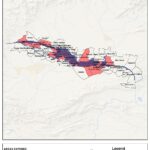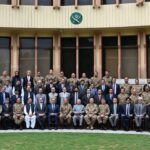UNITED NATIONS, Feb 07 (APP): The full scale of the multiple earthquake disaster in Türkiye and Syria is still unfolding, UN humanitarians said on Tuesday, as they stressed the critical need to step up search and rescue efforts for victims and ensure that life-saving aid reaches all those who need it.
According to the Government of Türkiye, at least 3,381 people died and more than 20,000 were injured after a 7.8 magnitude quake struck close to the southern city of Gaziantep early on Monday, followed by another 7.5 magnitude earthquake several hours later
Almost 6,000 buildings have reportedly collapsed in the country, too, said Jens Laerke, spokesperson for the UN Office for the Coordination of Humanitarian Affairs (OCHA).
Syria’s needs are massive, the OCHA spokesperson added, as he relayed information from the country’s health authorities which reported 769 deaths and 1,448 injuries from the earthquakes, in Aleppo, Latakia, Hama, Idlib countryside and Tartus.
After enduring the initial massive earthquakes, traumatized communities in Syria then faced more than 200 aftershocks.
“This of course came at the worst possible time for many, many vulnerable children in those areas who were already in need of humanitarian support,” said James Elder, spokesperson for the UN Children’s Fund (UNICEF).
“They went to bed as normal, they were woken by the screams of their neighbours, by breaking glass and by the terrifying sound of crumbling concrete.”
Although Syria is in crisis after 13 years of war, there is a particular concern for all those affected by Monday’s disaster who live in opposition-held areas in the northwest of the country, often after being forced to flee their homes multiple times because of heavy fighting.
“It was already an emergency situation across northwest Syria where four million people receive humanitarian support. Communities there are grappling with the cholera outbreak, a brutal winter and of course, ongoing conflict,” Elder explained.
Echoing those concerns, the UN refugee agency, UNHCR, said that the situation is tragic in the 10 Turkish provinces affected by the earthquakes.
The intensity of the earthquake which affected Türkiye and Syria is shown in darker colours.
In some of these affected provinces in Türkiye, 50 per cent of people are now refugees, while in Syria, UNHCR spokesperson Matthew Saltmarsh described the earthquake emergency as a “hammer blow” for displaced populations who have no work and whose savings have been exhausted. “We’re in the depths of winter, we’ve been seeing snowstorms and of course, you know, the war has been going on for over a decade,” he said.
As international search and rescue teams arrive in the region, coordinated by OCHA, Laerke, the spokesperson, stressed that “there’s a window of about seven days…where we’ll find alive survivors. It can happen later, but it’s really critical that these teams get out there as soon as possible.”
Rescuers search for survivors under the rubble in the Al-Aziziyeh neighbourhood in Aleppo Syria.
Aside from the material damage to roads and public infrastructure which has made the work of emergency teams more difficult, Syria’s dire economic situation has also slowed the relief effort.
“Search and rescue efforts are currently hampered by lack of equipment to remove debris,” said Tommaso Della Longa, spokesperson for the International Federation of Red Cross and Red Crescent Societies (IFRC). “There is a severe lack of fuel all over Syria and this has hampered operational heavy machinery, transport of personnel and emergency ambulance services.”
In line with the UN Secretary-General’s appeal for all countries to support all those “already in dire need of humanitarian aid”, Laerke issued a heartfelt appeal for help. “It is imperative that everybody sees this…for what it is: a humanitarian crisis where lives are at stake. Please, don’t politicize any of this, let’s get the aid out to the people who so desperately need it.”
To date, around 8,000 people have been rescued by emergency teams coordinated by the Turkish Disaster and Emergency Management Authority (AFAD), according to UNHCR.
Other UN agencies and partners have also provided lifesaving support on the ground, including the World Health Organization (WHO).
“We’ve actually been able to move trauma and surgical kits cross-border from Gaziantep where of course we have prepositioned supplies and we have been able to supply 16 hospitals in Syria, in the affected areas in Syria, as of yesterday,” Dr. Margaret Harris, WHO spokesperson, said.
In a special briefing during WHO’s executive board session, WHO chief Tedros Adhanom Ghebreyesus, said it was now “a race against time” to rescue as many survivors as possible. He announced that three charter flights would take off from both affected countries, with medical supplies including major surgical trauma kits, from WHO’s logistics hub in Dubai.
“We will work closely with all partners to support authorities in both countries, in the critical hours and days ahead, and in the months and years to come as both countries recover and rebuild”, said Tedros. “To our sisters and brothers from Türkiye and the Syrian Arab Republic, we all stand with you in this moment of unspeakable grief.”
According to the UN Relief and Works Agency (UNRWA), about 90 per cent of those Palestinian refugee families in Syria require humanitarian assistance because of the earthquakes.
Some 438,000 Palestinian refugees live in Syria’s 12 refugee camps and northern Syria is home to 62,000 Palestine refugees in Latakia, Neirab, Ein-el Tal and Hama.
Adding his voice to those expressing sympathy for all those affected by the disaster, the UN Special Envoy for Syria, Geir Pedersen, said that he was deeply saddened by the tragic loss of life and massive destruction.







